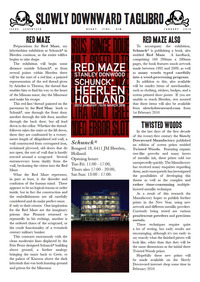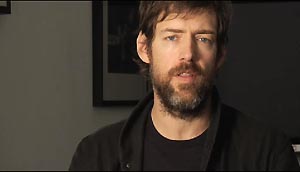Dead Air Space 更新。Thomの投稿。
コペンハーゲンから戻ってから、深刻な時期として沢山の事をこなしているというThom。
「僕に会う人みんながそれについて話したがっている…誰もが腹を立て、絶望している。そして僕はそれについて話すときは依然ポジティヴでいようとしている。…たぶんこれらの会議でポジティヴに何かが決まるのだろうと単純に考えていた世界中のまともな人たちの心の奥で何かが呼び覚まされたのかもしれない。」と。
こういった強い反応で期待もあるけど、それには建設的なチャンネルが必要だとも。
hey-
i guess this time of year is a time for serious reflection and i have been doing a lot of that since coming back from copenhagen.
you know what has stunned me coming back is the anger you can taste in the air about this, everybody i meet wants to talk about it.. everyone is angry and despairing and i have tried to remain positive when i talk to them about it.. it has perhaps awakened something in the back of the mind of sane people throughout the world who perhaps naively assumed that something positive would come of these talks.
with such a strong reaction i hope perhaps that people are starting to join the dots and our unquestioning worship of an unlimited gluttonous carbon based economy could unravel in just enough time.
sane people in government, in the media, and on the streets are being shaken reluctantly from a dream looking at the children around them and are getting angrier than they have ever been before.
but this energy needs a constructive channel.
i have been trying to write something about my impressions of being there etc, but then Ben Stewart from Greenpeace happened to send me something he wrote on the last night which is so much better than anything i've done so far so i'll leave it to him for now
and wish you a heartfelt joyful christmas.
"The most progressive U.S. President in a generation comes to the most important international meeting since the Second World War and delivers a speech so devoid of substance that he might as well have made it on speakerphone from a beach in Hawaii. His aides argue in private that he had no choice, such is the opposition on Capitol Hill to any action that might challenge the dominance of fossil fuels in American life. And so the nation which put a man on the moon can’t summon the collective will to protect men and women back here on Earth from the consequences of an economic model and lifestyle choice that has taken on the mantel of a religion.
Then a Chinese Premier who is in the process of converting his Communist nation to that new faith (high-carbon consumer capitalism) takes such umbrage at Obama’s speech that he refuses to meet – refuses, in fact, to do much of anything beyond sulking in his hotel room, as if this were a teenager’s house party instead of a final effort to stave off the breakdown of our biosphere.
Late in the evening the two men meet and cobble together a collection of paragraphs which they call a ‘deal’, although in reality it has all the meaning and authority of a bus ticket, not that it stops them affixing their signatures to it with great solemnity. Obama’s team then briefs the travelling White House press pack – most of whom, it seems, understand about as much about global climate politics as our own lobby hacks know about baseball – and before we know it the New York Times and CNN are declaring the birth of a ‘meaningful’ accord.
Meanwhile a friend on an African delegation emails to say that he and many fellow members of the G77 block of developing countries are streaming into the corridors after a long discussion about the perilous state of the talks, only to see Obama on the television announcing that the world has a deal. It’s the first they’ve heard about it, and a few minutes later, as they examine the text, they realise very quickly that it effectively condemns their continent to a century of devastating temperature rises.
By now the European leaders – who know this thing is a farce but have to present it to their publics as progress – have their aides phoning the directors of civil society organisations spinning that the talks have been a success. A success? This deal crosses so many of the red lines laid out by Europe before this summit started that there are scarlet skid marks across the floor of the Bella Centre, and one honest European diplomat tells us this is a ‘shitty shitty deal.’
Quite.
This deal is beyond bad. It contains no legally binding targets and no indication of when or how they’ll come about. There isn’t even a declaration that the world will aim to keep global temperature rises below 2 degrees C – instead leaders merely ‘recognise the science’ behind that vital threshold, as if that were enough to prevent us crossing it. The only part of this deal anyone sane came close to welcoming was the $100bn global climate fund, but it’s now becoming apparent that even that’s largely made up of existing budgets, with no indication of how new money will be raised and distributed so poorer countries can go green and adapt to climate change.
Not all of our politicians deserve the opprobrium of a dismayed world. Our own Ed Miliband fought hard on no sleep for a better outcome, while President Lula of Brazil offered to financially assist other developing countries to cope with climate change and put a relatively bold carbon target on the table. But the EU didn’t move on its own commitment (one so weak we’d actually have to work hard not to meet it) while the United States offered nothing and China stood firm.
Before the talks began I was of the opinion that we would only know Copenhagen was a success when plans for new coal-fired power stations across the developed world were dropped. If the giant utilities saw in the outcome of Copenhagen an unmistakable sign that governments were now determined to act, and that coal plants this century would be too expensive to run under the regime agreed at this meeting, then this summit would have succeeded. Instead, as the details of the agreement emerged last night we received reports of Japanese opposition MPs popping champagne corks as they savoured the possible collapse of their new government’s carbon targets. It’s not just that we haven’t got to where we needed to be, we’ve actually ceded huge ground. There is nothing in this deal – nothing – that would persuade an energy utility that the era of dirty coal is over. And the implications for humanity of that simple fact are profound.
I know we greens are partial to hyperbole. We use language as a bludgeon to direct attention to the crisis we’re facing, and you’ll hear much more of it in the coming days and weeks. But really, it’s no exaggeration to describe the outcome of Copenhagen as an historic failure that will live in infamy. In a single day, in a single space, a spectacle was played out in front of a disbelieving audience of people who have read and understood the stark warnings of humanity’s greatest scientific minds - and what they witnessed was nothing less than the very worst instincts of our species articulated by the most powerful men who ever lived.
I will leave the last word to the late Kurt Vonnegut Jr., who would have given voice to the insanity of Copenhagen better than I ever could, and whose poem Requiem is perhaps appropriate at this moment: ‘When the last living thing, has died on account of us, how poetical it would be if Earth could say, in a voice floating up, perhaps from the floor of the Grand Canyon, “It is done. People did not like it here”.’
Thom






















 Shye Ben Tzur,Jonny Greenwood and the Rajasthan Express - JUNUN
Shye Ben Tzur,Jonny Greenwood and the Rajasthan Express - JUNUN